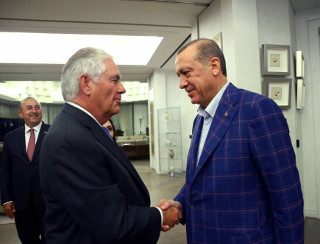Talks during Secretary of State Rex Tillerson’s visit to Turkey have yielded an agreement with regard to the Kurdish-held city of Manbij. Pending some further agreement, the US and Turkey have agreed not to directly fight over Manbij.
The Manbij question is a long-time issue. The city is held by the Kurdish YPG, and some US troops are deployed within. The Kurds captured Manbij, on the western shore of the Euphrates River, from ISIS in a US-backed operation.
Turkey has a problem with it, having long insisted that the Kurds aren’t allowed west of the Euphrates. While the US initially suggested the Kurds would leave the city and let locals govern it, they never did. In recent weeks, Turkey has threatened to target US troops in the city for backing the Kurds, and US officials have suggested they’d fight the Turks to keep them out. The new agreement is that the two nations won’t fight, which was unlikely anyhow.
What is going to happen to Manbij is unclear, as they didn’t really agree to anything specific. Turkey has suggested expelling the Kurds from Manbij outright and then controlling the city with a joint US-Turkish deployment. There is no indication that the US has proposed their own plan, and it may well be the two sides negotiate for some time on what happens to the YPG-held city, talks that won’t include the YPG.
Turkey has suggested joint operations with the US in the past as an alternative to the US alliance with the Kurds. At this point, however, the Kurds control about 25% of Syria, and 2,000 US troops are embedded across the area. Splitting with them may be harder for the US than Turkey realizes.



